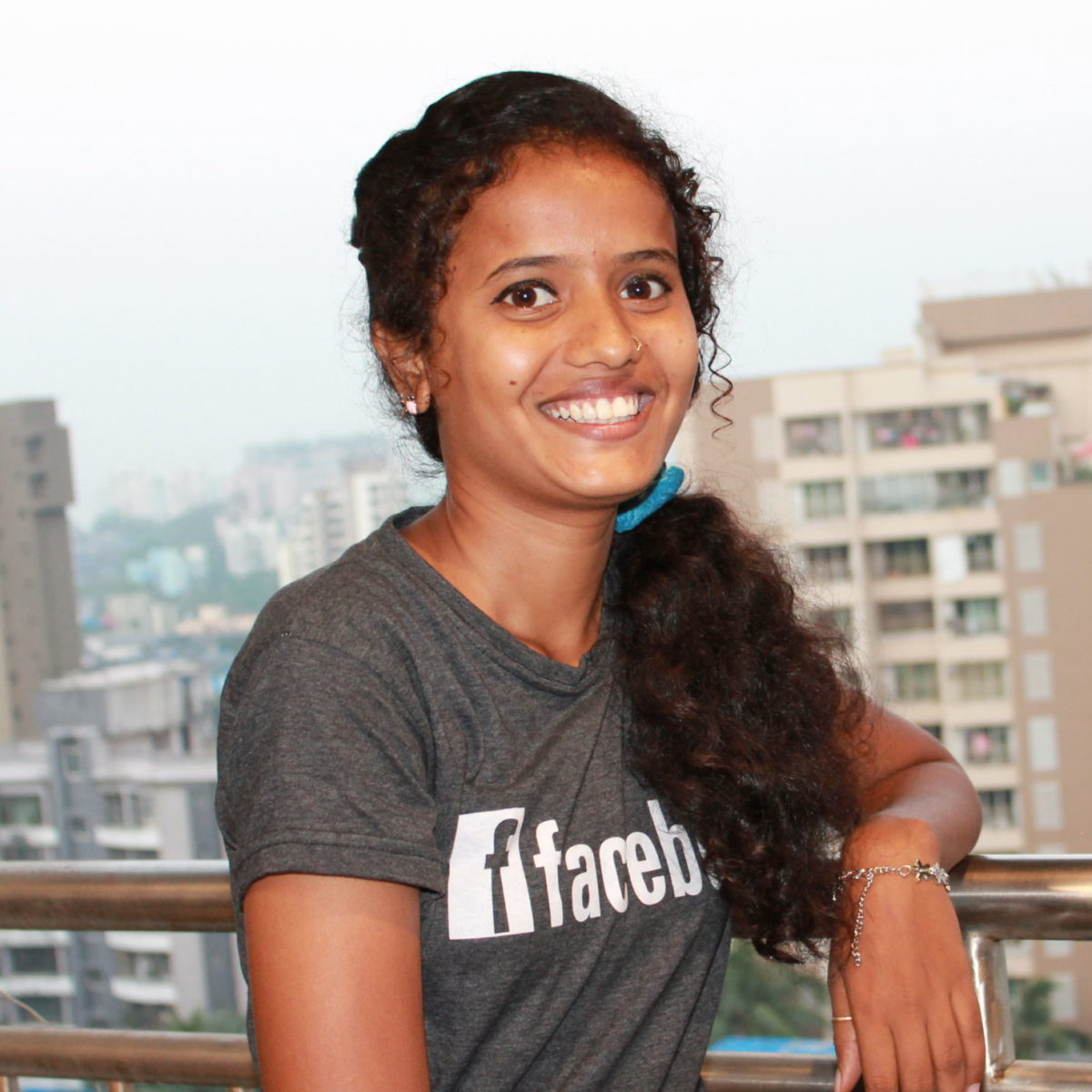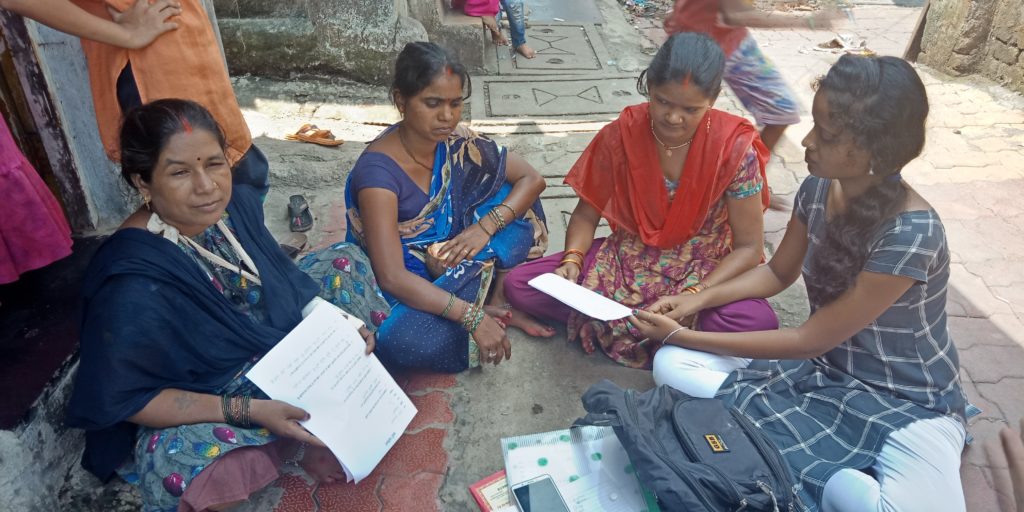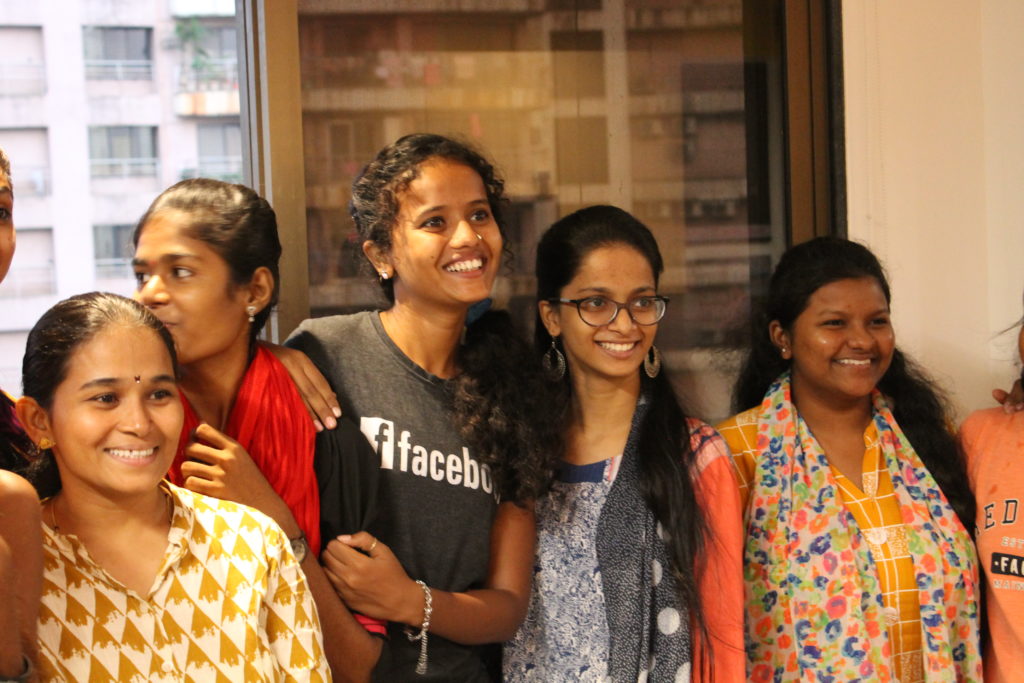
Blog
We all have a right to say something, to express ourselves. I think whenever we feel something is wrong or different, we need to talk about it.
When She Leads: Parvati
June 22, 2020
Reading Time: 9 minutesThis interview is part of our When She Leads Under Lockdown series. Learn more.
As the deadly spread of COVID-19 continues, many young women in India face the prospect of their family migrating away from the city back to their village of origin. Due to the lockdown and loss of income, many families feel this move will ensure their wellbeing. However, our partner sites know the long-term impact this relocation can have on the young women’s ability to pursue their educational goals. Parvati is a third-year Shadhika Scholar pursuing a Bachelor’s Degree of Banking & Insurance and a participant with our grantee partner site Vacha, in Mumbai. Parvati was interviewed by Kendra Nicolai, Program Officer, and Sabah Siddiqui, Donor & Program Associate.
Parvati, we’ve heard from leaders at Vacha that you were able to negotiate with your family about them wanting to migrate. Can you tell us about how this happened?
My family was discussing that everyone in our community is migrating to their villages and that our family should also migrate from here (Mumbai). Because of the lockdown, everything has been postponed, and things are worse than before. Many of my family members have lost their jobs. I tried to negotiate with my parents to stay in the city, and argued that things are bad here, yes, but also the coronavirus is in the village too and things will not be better there. But my family was not convinced.
I have been negotiating so well with my family and relatives, but they aren’t changing their minds. In Mumbai, the coronavirus is increasing, and I understood the concerns. I told them if we move to the village, I can’t attend Vacha or school. I learned how to negotiate from Vacha, and in these lessons I learned that it is important to respect all opinions. But we did migrate to our home village. I am finding it very sad. It is difficult to understand how I’m feeling these days.
Since we migrated, I have seen so many problems, especially Internet network issues. When my college reopens in the future, I will have to go back to Mumbai to participate and continue my studies. I am facing so many problems with online classes, college, and computer classes. I have continued to negotiate with my parents and explained that I need to return to Mumbai because I am missing so many online classes and this will affect my studies. I finally convinced my brother of this, and we are planning to go back to Mumbai next week on Monday.

Can you share with us what is has been like to be in your village?
When we arrived to the village, we quarantined for 8 days. After that, we went to our family’s village house. In the village they have a very rural culture, and they believe in many rituals. If someone gets ill, they avoid them. For people with the coronavirus, it is much worse. Even after people have completed certificate for quarantine and they don’t have COVID-19 anymore, villagers still treat them very badly. None of our relatives are talking to us because they fear we have the coronavirus. When we go outside, village leaders and neighbors tell us to go back inside and don’t want us to interact with anyone. I know my rights and that these people can’t mistreat me.
As a participant at Vacha, I have learned about so many things, including child marriage. I heard there was going to be a marriage in the village and that the young woman was 4 years younger than me. I went and talked to her about being married. In the village they are teaching girls since childhood about getting married and so young girls expect this. When I was talking to her, she had no reaction. I explained why she needed to negotiate and that she should not agree to get married but she didn’t give me any answer. I asked her about education and she said she studied through 6th Standard in a government school. I shared with her that she could study in different ways – how an educated girl is important for society and how girls can do anything. I told her that I’m getting an education and what I’m studying. I was trying to help her understand. Today she is getting married. She told me she is getting married so early because her financial condition is poor. She wasn’t able to complete her studies because her parents won’t allow it. In India, if you pass 7th Grade, then often you can get a hostel room to keep studying. She said she has to help her parents in household chores, so she couldn’t keep studying and now she is married. This makes me really sad. I have learned so much from Vacha and Shadhika. Now I am thinking, how can I spread this important information? This village doesn’t have an NGO, so I think in the future I’d like to create awareness in this village.

What do people in the village think about you pursuing your college degree?
Whenever my family comes back to our village, everyone sees me as an idol, because I’m the only girl who is still studying. Other girls tell me they are inspired and want to complete their studies too. They tell me that they didn’t get the chance to complete their studies. In the village, even if girls graduate, the problem is they cannot get a job here. My parents feel proud when we visit the village because they are allowing their daughter to complete her studies.
Community members ask my parents why they allow me to study. Sometimes villagers target my parents saying, “Why are you letting her study?” But most of the time my parents directly question them and say, “We know Parvati. She is able to complete her education and she can stand on her feet. In the future she wants to be something, why would we demotivate her?” I know people in the village think I should be married and are eager to find chances to bring marriage proposals to my parents. They want to demotivate me and will question why my parents allow me to be on social media. They think this is a way to convince my parents to stop my studies and get me married.
My parents have been supportive since I was a little girl. They saw my progress at school and at Vacha, especially that I am a strong communicator. When my college has a parents meeting, my brother goes and he is always proud of me. My teachers say that I am an excellent student and do extra work. My brother tells my parents what my teachers say and they understand. I have negotiated every step of the way. When I learn something, I share with it my family and move them forward. I think my parents want me to reach my dreams, whatever society says about me. They really support me.
How has migration of girls and families impacted the future for girls?
Like I was saying before, there are no jobs in the villages. Those communities practice old rituals and expect girls to get married. They pressure families who allow their daughters to study.
How are you coping with all of this uncertainty?
Today I am still in the village, so our electricity is not working properly. I have household chores everyday so I don’t have the chance to attend my classes. My friends try to call and share with me what subjects they have completed. Online classes are for one month, and then we take an exam. Because I haven’t taken classes in the village and I don’t have notes or my books, I won’t be able to take the exam. I feel stuck in this situation but I am hopeful to go back to Mumbai and begin my online studies again.
Since the lockdown started 3 months ago, I have been thinking about the future. If I have to stay in the village, how will I get a job? My parents think I should go back to the village after graduation, but maybe I can convince them differently. They are saving money for my marriage if I don’t get a job. I want to negotiate with my parents for me to have a job for one year after graduation before they think of my marriage. I know if I get a job, they will delay my marriage.
How does it make you feel when you negotiate with your parents and they listen?
We have an agreement that we will listen to each other and come to an understanding. I feel good to negotiate. We all have a right to say something, to express ourselves. I think whenever we feel something is wrong or different, we need to talk about it. I speak up anytime my parents are making a decision related to me. If girls are quiet, their parents will make decisions without them. I negotiate all the time – I’m an expert.
Shadhika continues to closely monitor the circumstances in India in order to best support our partners and program participants. In order to remain nimble and responsive to the needs on the ground, please help us meet our goal of raising an additional $15,000 for COVID-related funds.
Read more